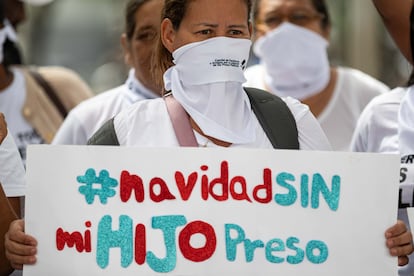Two political prisoners dead in 72 hours: Alarm rises over conditions in Venezuela's prisons
Relatives of the deceased have denounced the lack of medical care and mistreatment in the prisons. Both victims were arrested during the protests that followed the June 28 elections

Venezuelan political prisoner Oswual González, 43, died on Monday in Tocuyito prison, Carabobo state, reportedly due to inadequate medical care after experiencing high blood pressure and severe abdominal pain linked to a liver condition. González had been arrested on August 1 in Lara state, approximately four hours from Caracas, along with his 19-year-old son, who remains imprisoned. Their arrest occurred shortly after the July 28 presidential elections, amid nationwide protests against the election results, which declared Nicolás Maduro the winner.
The protests, marked by widespread public discontent, resulted in 27 deaths and nearly 200 injuries. In response, Maduro pledged swift “justice” for dissenters and arranged for the expansion of prisons like Tocuyito and Tocorón, traditionally used for common criminals, to house political prisoners. At least 2,300 individuals were detained during those demonstrations.
In its complaint, the Venezuelan Prison Observatory (OVP) and the Committee for the Freedom of Political Prisoners (CLPP) reported that González had shown signs of depression after his imprisonment. He later experienced “severe abdominal pain” that was misdiagnosed, and received delayed treatment. According to OVP, González’s family were “not given precise information about his clinical condition.”
González’s death marks the third fatality of an opposition activist in Venezuelan prisons in recent weeks, and the second within 72 hours at Tocuyito. Days earlier, Jesús Álvarez, 22, reported the death of his father, Jesús Rafael Álvarez, 44, who had been arrested on July 28 during the same protests. It is reported that he too died from lack of medical attention.
The younger Álvarez stated that he learned of his father’s death when he was shown a photograph of the corpse for identification. “In that photo, Álvarez was unrecognizable: emaciated, bearded, very thin, with signs of having been beaten,” said the complaint from the OVP and CLPP.
Álvarez’s mother, Anny Sánchez, is also in prison: both were arrested in a raid on their home. The young man said that his father was in good health before his arrest and claimed that he was repeatedly mistreated. His father’s body was finally handed over to him, after initial denials.
Just a month earlier, on November 15, opposition activist Jesús Manuel Martínez, 36, died in Puente Ayala prison in Anzoátegui state. A member of the Vente Venezuela party, led by opposition figure María Corina Machado, Martínez suffered rapid health deterioration due to complications from diabetes. The Public Prosecutor’s Office claimed acknowledged Martínez’s death but argued he “had received proper medical attention and was given the medicines he needed.”
Machado, however, denounced the death as a result of the “inhumane conditions” under which he was held, following his detention “without a warrant or a reason.”
In response to international and domestic pressure, the Venezuelan government recently agreed to review several judicial proceedings against opposition members, leading to the release of 300 political prisoners, including numerous teenagers, according to official figures. However, the NGO Foro Penal disputes these numbers, stating that only 208 individuals have been released.
Foro Penal further reports that over 1,900 political prisoners remain in custody in Venezuela, the highest number in the hemisphere, surpassing figures in Cuba and Nicaragua. These numbers have surged in 2024, particularly after the post-election protests on July 28, during which demonstrators toppled nine statues of Hugo Chávez across the country.
Sign up for our weekly newsletter to get more English-language news coverage from EL PAÍS USA Edition
Tu suscripción se está usando en otro dispositivo
¿Quieres añadir otro usuario a tu suscripción?
Si continúas leyendo en este dispositivo, no se podrá leer en el otro.
FlechaTu suscripción se está usando en otro dispositivo y solo puedes acceder a EL PAÍS desde un dispositivo a la vez.
Si quieres compartir tu cuenta, cambia tu suscripción a la modalidad Premium, así podrás añadir otro usuario. Cada uno accederá con su propia cuenta de email, lo que os permitirá personalizar vuestra experiencia en EL PAÍS.
¿Tienes una suscripción de empresa? Accede aquí para contratar más cuentas.
En el caso de no saber quién está usando tu cuenta, te recomendamos cambiar tu contraseña aquí.
Si decides continuar compartiendo tu cuenta, este mensaje se mostrará en tu dispositivo y en el de la otra persona que está usando tu cuenta de forma indefinida, afectando a tu experiencia de lectura. Puedes consultar aquí los términos y condiciones de la suscripción digital.








































